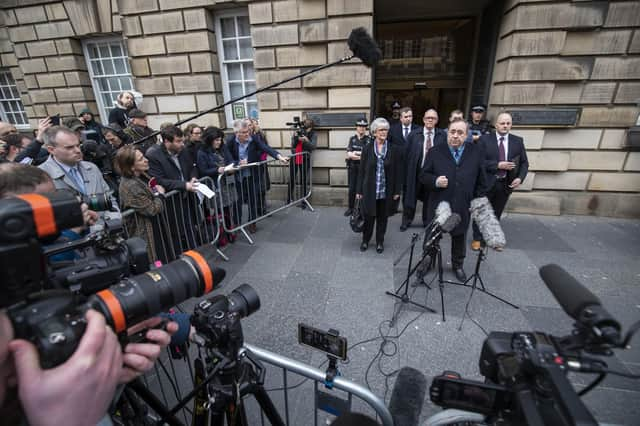Alex Salmond's court cases show need to separate political and prosecution roles of Lord Advocate – Kenny MacAskill


The Lord Advocate is one of the great Scottish offices of state. In much of the 18th and early 19th century, it wielded political and legal power. Under some office holders such as Henry Dundas and his nephew Robert it was omnipotent and frequently abused. It wasn’t until 1827 that political affairs were handed to the Home Office or until 1885 that the Secretary of State for Scotland’s office, abolished after the Jacobite Rebellion in 1745, was restored.
Those moves to London and then supposedly to Scotland’s man in London saw the political role relinquished but legal responsibilities retained. It’s a hybrid role for as well as being the head of the prosecution service, it also involves being a legal adviser to the Scottish Government. That’s something that isn’t replicated in most other jurisdictions. In England, there’s a Director of Public Prosecutions for criminal cases and the Attorney General for legal advice to Government.
Advertisement
Hide AdAdvertisement
Hide AdFurther changes have been made in Scotland with devolution and the post was removed from the UK Cabinet. Subsequently, by practice, attendances at Scottish Cabinet meetings were restricted to participation on legal matters. But those twin roles of head of the prosecution service and legal advisor to Government remain. It’s something I’ve always felt was wrong, believing that the positions should be entirely separate. Justice has not only to be done but must be seen to be done.
James Wolfe, the current incumbent, is an excellent lawyer and a thoroughly pleasant man. Normally, there isn’t an issue as conflicts don’t arise. But the Alex Salmond trial, and the role of the Lord Advocate in it, call into question those dual responsibilities and the position it puts the post holder in.
For the backdrop to the Alex Salmond trial was the judicial review that the former First Minister brought against the Scottish Government. That wasn’t a criminal case but a civil matter, but it required legal advice and action.
Now there’s an extensive Scottish Government legal department though ultimately the counsel is the Lord Advocate and it’s to him they would defer to and, likely, seek advice from. We also know through a response to a Freedom of Information request that’s been published that a committee was established by the Government to deal with this judicial review.
Convening at least 17 times between the end of August 2018 and January 2019, it had numerous attendees including senior advisers and even it seems the First Minister on occasion. The names of legal representatives are redacted and so we don’t know whether they were Scottish Government legal department officials or law officers like the Lord Advocate or his deputy the Solicitor General. However, it would be safe to assume that it’s unlikely that the Scottish Government would either proceed without his approval or contrary to his counsel.
But what of the criminal prosecution? The Lord Advocate did subsequently recuse himself as, to be fair, is the norm in such high-profile cases involving political figures. It would seem though only after he had already, wearing another hat, directed it there. In any event, whilst there’s no suggestion of any impropriety on those who then dealt with the prosecution, it certainly raises questions about perception. When the boss makes a referral in any post you don’t take it lightly.
Almost confirming that, during the criminal trial, evidence was given that the Crown Agent, a position accountable to the Lord Advocate, was offering the Scottish Government’s report from the civil case to the police, as evidence to be used for the criminal prosecution. The police rightly seemed to baulk at that and proceeded with their own investigations. The Lord Advocate may not have been responsible for that, but it was one of his most senior officials and emanating from a civil case he had been involved in.
Further twists have taken place since Alex Salmond’s acquittal. A contempt of court charge has been brought by the Crown against a well-known blogger relating to the potential identification of witnesses. Such actions are rare indeed. Strangely though, no action was taken against a newspaper carrying a montage of the accused amidst a litany of heinous individuals the day before the trial.
Advertisement
Hide AdAdvertisement
Hide AdWitnesses are entitled to anonymity. But there must be no doubt about whether the Lord Advocate’s pursuing a case for the Scottish Government with whom many are closely linked or acting in the public interest as the head of the prosecution service. The roles need spilt, perception matters as much as reality matters.
Kenny MacAskill is the SNP MP for East Lothian